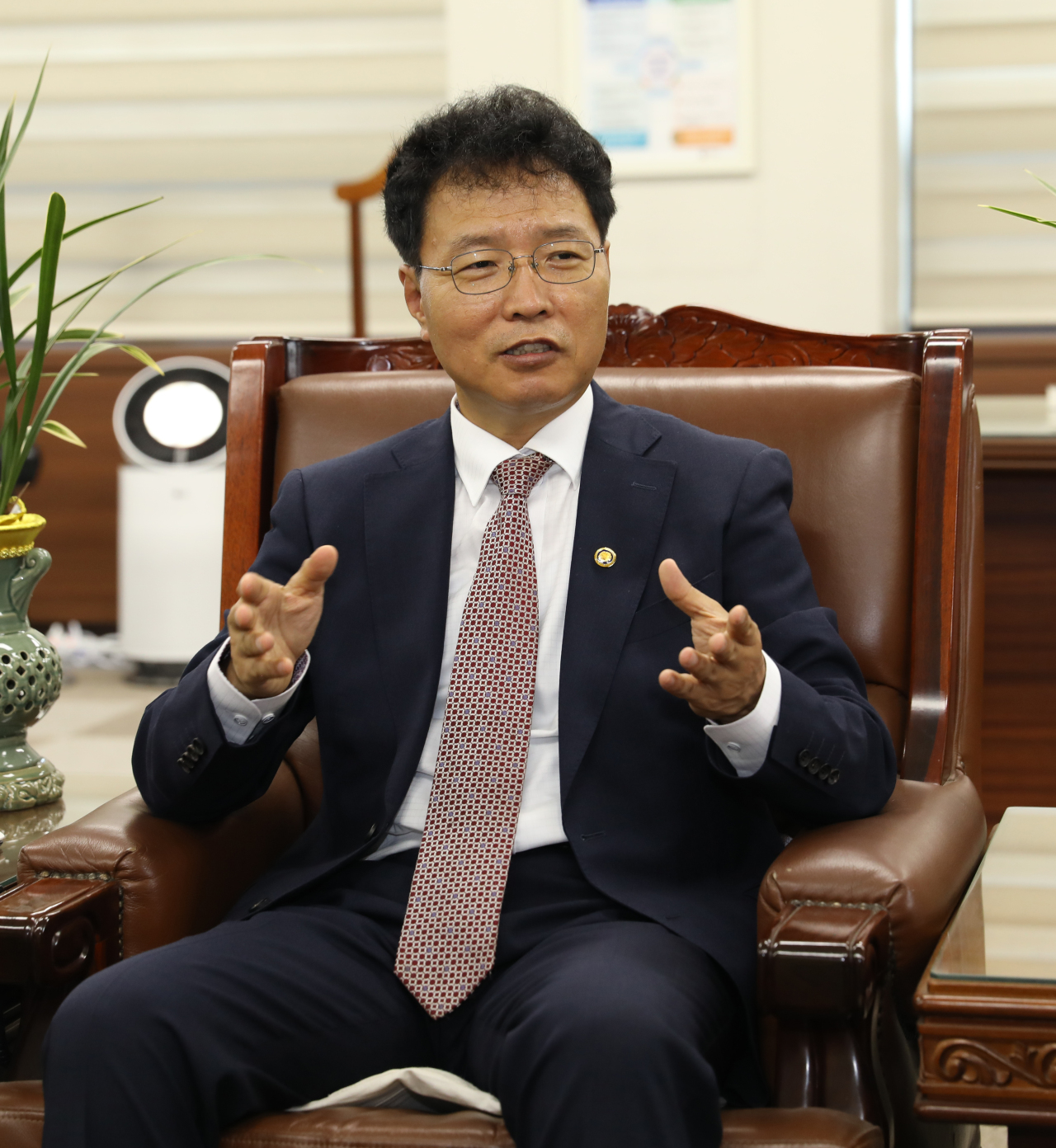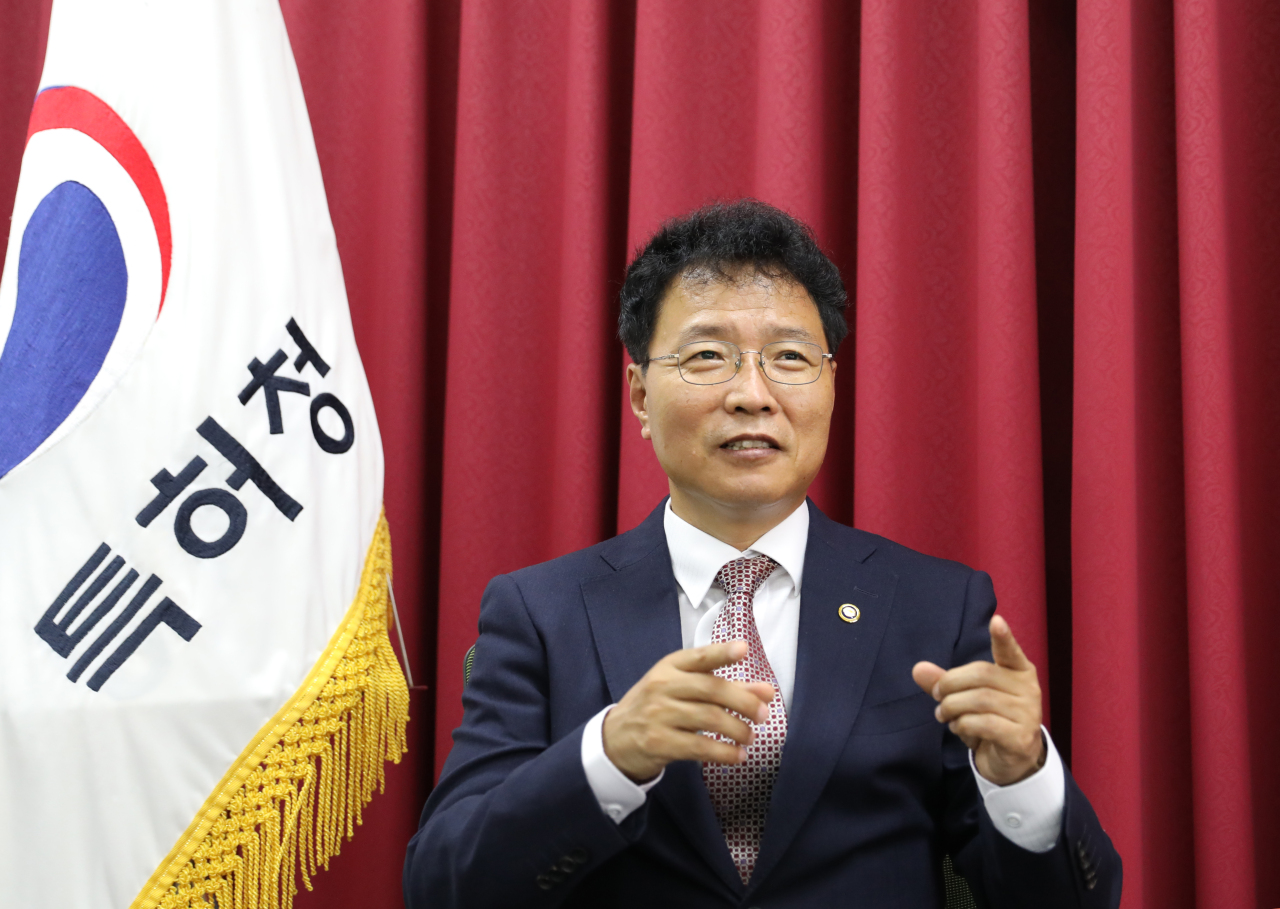 |
KIPO Commissioner Kim Yong-rae (KIPO) |
In line with the digitalization of industries accelerated by the COVID-19 pandemic, the chief of the nation’s intellectual property office vowed Tuesday to “open an era of digital IP” via systemic upgrades.
“In order to resolve key issues tied to protection of core values of the digital era, we will update laws that can bolster IP protection in the process of data manufacturing, transfer and utilization and address issues surrounding creative rights of inventions by artificial intelligence,” the Korean Intellectual Property Office Commissioner Kim Yong-rae said.
The vow to digitalize IP also includes the digitalization of the nation’s IP administrative system and expansion of open IP data amounting to some 4.7 million cases and building an IP big data platform based on AI technology, Kim added.
Kim pointed to IP as a competitive edge Korea could gain in the post-virus era, saying that as movements are restricted and the digital economy is accelerated, global protectionism towards IP would be further highlighted to protect each economy’s core technologies such as AI.
The coronavirus pandemic has prompted an acceleration of economies and industries and brought major changes in the global trade system including the spread of trade protectionism, expansion of digital trade and restructuring of global value chains, the IP chief noted.
KIPO, under Kim’s leadership has formed a special task force for digital IP, which has been mapping out strategies to push IP as a driving force behind digital economy. The IP office has been collecting information and opinions from the private sector and hosted a digital IP forum on Nov. 5, as part of the effort.
Besides digitalization of IP, another key task for KIPO would be resolving the issue of so-called “Korea research and development paradox,” through an IP-centered stance.
“While Korea has been making the largest R&D-to-GDP investment and has the largest number of researchers-to-total population, it has been criticized for its R&D’s lackluster economic outcomes and progress,” Kim said.
“This translates into the fact that the nation has been making less profit from IP compared with its investment in IP.”
To resolve this, Kim said that a virtuous cycle of IP creation, protection and utilization must be adopted and KIPO plans to establish a system that could help creators profit more from IP compared with money spent developing it.
Kim called for the need to heighten the effectiveness of the nation’s R&D by applying IP technology and analysis to “every step” of the way. On top of that, adopting a culture of “strategic IP management” -- which would smooth out the decision of whether the country will create IP, or either directly or indirectly purchase them – would help Korea gain a sharper focus on R&D.
While Asia’s fourth largest economy has the potential to become a digital IP nation, Kim expressed concern regarding the lack of patent examiners here compared with the number of patents filed annually.
“Every year South Korea sees roughly 220,000 patents filed, which is the fourth highest after China, the United States and Japan,” he said.
“However, the lack of patent examiners translates into a heavy workload –- double and triple the workload of key economies -– and difficulties in making quality, yet swift decisions.”
According to data provided by KIPO, there were 920 examiners in Korea as of last year compared with 1,682 in Japan and 8,125 in the US, in the same period. In 2018, China had 12,000 examiners while the EU had 4,276.
 |
KIPO Commissioner Kim Yong-rae (KIPO) |
South Korean examiners handled 194 patent cases per person last year, while Japan and the US examiners managed 166 and 74 cases per person in the cited period.
Kim said that in a bid to take some burden off local examiners’ shoulders, KIPO has been discussing with related ministries and agencies on time management and funneling more people into the workforce.
 |
KIPO Commissioner Kim Yong-rae (KIPO) |
Furthermore, KIPO would focus on advancement and digitalization of patent assessment by utilizing AI technology and continue to update the process and standards, so it could bring about effective and quality results, he stressed.
On AI-invented patents, which has rose as both a controversy and a key IP issue in the recent decade, Kim said that it would discuss with both industrial and legal experts on the matter.
“At the moment, we are facing difficulties in assessing patents tied to innovative technology, including AI, under the existing system because it is usually a combination of more than two different technologies,” he said.
“But we have been updating related rules, so that such technologies, including AI and bio health, could be well-protected.”
Regarding the planned introduction of the IP discovery system –- which legally allows the exchange of evidence between infringers and right holders in respect to IP infringement litigations -– and the concerns that it could prompt multiple lawsuits from overseas companies, Kim explained that the system is a necessary change.
Onlookers have said that without the system, it has been difficult for IP holders to receive damage compensation even if their rights are violated, which is the main reason that local firms file a lawsuit overseas to protect their rights.
“The implementation of the Korean discovery system would strengthen the rights of patent holders and drive development of industries and technologies,” Kim said.
“Most small- and medium-sized firms are supporting the introduction of the discovery system because under the current legal system, it is difficult for them to procure evidence related to IP infringement and feels pressure of time and cost.”
The system would work as a platform for SMES to fight for their rights against much bigger firms and is anticipated to work as a suppressant of IP infringement and technology theft among companies, the IP chief explained.
By Jung Min-kyung & Lee Kwon-hyung (
kwonhl@heraldcorp.com">mkjung@heraldcorp.com)(
kwonhl@heraldcorp.com)










